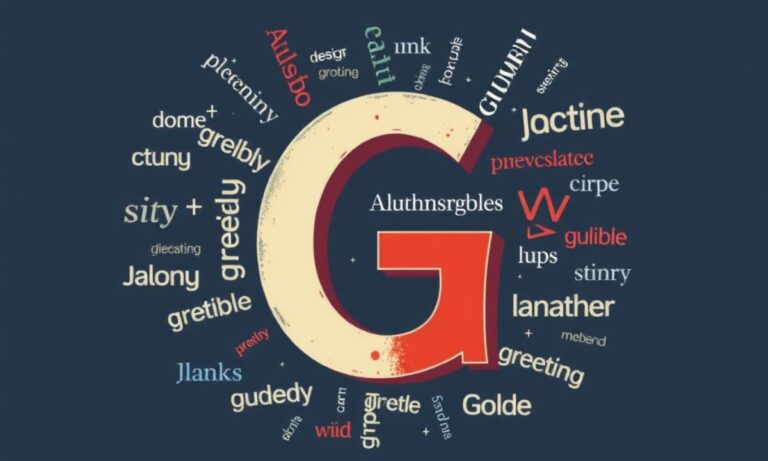Discover an extensive collection of 500+ negative words starting with the letter “G” perfect for expanding your vocabulary, enhancing your writing, and finding precisely the right expression for any situation.
From commonly used terms like “grotesque,” “grisly,” and “grueling” to obscure and unusual words, this comprehensive guide categorizes negative G-words by type—adjectives, adverbs, emotions, descriptors—giving you powerful language tools to express negativity with precision and impact.
READ MORE: https://fashiongravity.co.uk/negative-words-that-begin-with-the-letter-a/
Negative Adjectives That Start With G
Negative adjectives that start with G provide powerful descriptive tools for writers, speakers, and anyone looking to express disapproval or negativity with precision.
Words like “grotesque,” “gruesome,” and “grim” carry strong emotional connotations that immediately convey specific unpleasant qualities. When you describe something as “grotesque,” you’re not merely saying it’s unattractive—you’re conveying a sense of distortion so extreme it causes repulsion.
Similarly, “ghoulish” conjures images of death and the macabre, while “gruff” perfectly characterizes someone with a harsh, unfriendly demeanor.
These adjectives serve as linguistic shortcuts, efficiently communicating complex negative impressions through a single word.
Whether you’re crafting fiction with dark undertones, describing unpleasant situations in academic writing, or simply seeking to expand your vocabulary, these negative G adjectives offer nuanced alternatives to common descriptors like “bad” or “unpleasant.”
- Ghastly
- Grim
- Grotesque
- Gruesome
- Grisly
- Grave
- Greedy
- Grumpy
- Gloomy
- Ghoulish
- Grievous
- Grating
- Grouchy
- Gross
- Grimy
- Garish
- Gaudy
- Glum
- Guilty
- Gruff
- Graceless
- Gullible
- Gutless
- Gauche
- Grueling
- Gawky
- Ghastful
- Glaring
- Gobby
- Godawful
- Godless
- Gormless
- Gossipy
- Gouging
- Gristly
- Grudging
- Gruffy
- Grumbly
- Grinding
- Griping
- Groaning
- Groovy (negative in certain contexts)
- Growling
- Grudgeful
- Grumbling
- Galling
- Gaunt
- Ghoulful
- Gibbering
- Gloating
- Glowering
- Gnashing
- Grinding
- Grieving
- Guttural
- Grandstanding
- Grotty
- Gunky
- Grody
- Grungy
- Gossamer (negatively fragile)
- Gutted
- Gnarled
- Gnarly
- Ghostly
- Gagging
- Gangrenous
- Gastropodic
- Gluttonous
- Gutwrenching
Unusual Negative Words That Start With G
Unusual negative words beginning with G represent linguistic treasures that add depth and sophistication to communication while describing unpleasant concepts.
Terms like “ginglymus” (a hinge-like joint that can become painfully restricted) and “galbanum” (a bitter, strong-smelling resin) represent specialized vocabulary that can elevate writing from ordinary to extraordinary.
These uncommon words often derive from scientific terminology, ancient languages, or specialized fields, giving them precise meanings that more common words lack.
For writers seeking to distinguish their work, these unusual G-words provide opportunities to demonstrate linguistic prowess while avoiding clichés and overused expressions.
Many of these words have fascinating etymological backgrounds—”gadarene” refers to reckless behavior, alluding to the Biblical story of demons driving pigs over a cliff.
When used thoughtfully, unusual negative G-words can captivate readers through their unfamiliarity while simultaneously conveying exact shades of meaning impossible to achieve with everyday vocabulary, making them valuable additions to any wordsmith’s repertoire.
- Gaberlunzie
- Galimatias
- Gallinaceous
- Gallimaufry
- Gamboge
- Gambol
- Gamopetalous
- Garboil
- Gasconade
- Gastrolith
- Gazump
- Gelatigenous
- Geminate
- Gemütlich
- Genuflect
- Geomancy
- Gerund
- Gestic
- Gewgaw
- Gherkin
- Gibbet
- Gimcrack
- Glabrescent
- Glaciate
- Glair
- Glaucous
- Gleization
- Glisk
- Gloaming
- Glossolalia
- Glyptic
- Gnomon
- Gonfalon
- Gonoph
- Gormandize
- Gossamer
- Gramarye
- Grangerize
- Gravamen
- Gravid
- Greensward
- Grimalkin
- Grimoire
- Grogram
- Grommet
- Grosgrain
- Grot
- Grouthead
- Gudgeon
- Guggle
- Guillemot
- Gullery
- Gurnard
- Gussock
- Guttle
- Guttural
- Guyot
- Gymkhana
- Gyve
- Gyre
Obscure Words That Begin With The Letter G
Obscure words beginning with G offer fascinating linguistic depth for those who appreciate rare vocabulary with negative connotations.
Words like “glaikit” (foolish or thoughtless), “glower” (to stare angrily or with a scowl), and “gripe” (to complain persistently) represent language’s hidden treasures—terms that have fallen from common usage yet retain powerful expressive potential.
These obscure terms often come from regional dialects, archaic usage, or specialized jargon, making them particularly valuable for writers seeking authentic historical dialogue or unique descriptive language.
Many obscure G-words have no perfect synonyms in modern English, filling linguistic gaps with their precise meanings—“gormless” (lacking intelligence) conveys a specific type of foolishness different from similar words like “stupid” or “ignorant.”
When used judiciously, these obscure terms can elevate writing by creating distinctive voice, period authenticity, or technical precision.
Though challenging to incorporate naturally into everyday speech, these words reward the reader or listener with linguistic novelty while expanding communication beyond the limitations of common vocabulary.
- Gaberlunzie
- Galimatias
- Gallinaceous
- Gallimaufry
- Gamboge
- Gambol
- Gamopetalous
- Garboil
- Gasconade
- Gastrolith
- Gazump
- Gelatigenous
- Geminate
- Gemütlich
- Genuflect
- Geomancy
- Gerund
- Gestic
- Gewgaw
- Gherkin
- Gibbet
- Gimcrack
- Glabrescent
- Glaciate
- Glair
- Glaucous
- Gleization
- Glisk
- Gloaming
- Glossolalia
- Glyptic
- Gnomon
- Gonfalon
- Gonoph
- Gormandize
- Gossamer
- Gramarye
- Grangerize
- Gravamen
- Gravid
- Greensward
- Grimalkin
- Grimoire
- Grogram
- Grommet
- Grosgrain
- Grot
- Grouthead
- Gudgeon
- Guggle
- Guillemot
- Gullery
- Gurnard
- Gussock
- Guttle
- Guttural
- Guyot
- Gymkhana
- Gyve
- Gyre
Negative Adverbs That Start With G
Negative adverbs starting with G modify actions, adjectives, and other adverbs to express how something unpleasant occurs or intensifies negative qualities.
Words like “grimly,” “grudgingly,” and “gruesomely” add crucial descriptive layers to sentences by indicating the manner in which actions unfold.
Most of these adverbs follow the typical English pattern of adding “-ly” to corresponding adjectives (grim→grimly), making them relatively easy to incorporate into writing once you’re familiar with their adjectival forms.
These adverbs prove particularly valuable in creative writing where they help readers visualize scenes with greater clarity—describing someone who “grimly surveyed the damage” conveys much more than simply stating they “looked at the damage.”
The emotional weight these adverbs carry makes them effective tools for setting tone and atmosphere in narratives, especially when depicting challenging circumstances or difficult personalities.
For professional communication, these adverbs can precisely qualify statements to avoid misunderstandings, making them useful across contexts from creative fiction to technical documentation, academic writing, and everyday conversation.
- Grudgingly
- Gruffly
- Grimly
- Gruesomely
- Grouchily
- Grumpily
- Gloomily
- Grotesquely
- Grievously
- Gracelessly
- Ghastly
- Glibly
- Grubbily
- Gaudily
- Gutlessly
- Gravely
- Glaringly
- Gluttonously
- Greedily
- Gullibly
- Groundlessly
- Guiltily
- Garishly
- Grittily
- Graspingly
- Grossly
- Gauchely
- Gratingly
- Grindingly
- Glumly
- Ghoulishly
- Gruelingly
- Grimacingly
- Grievingly
- Groaningly
- Glitchily
- Gratuitously
- Greasily
- Gloweringly
- Grovelingly
- Gnashingly
- Growlingly
- Gnawingly
- Goutily
- Grainily
- Graysomely
- Gnarlingly
- Gawkily
- Goofily
- Goutishly
- Gawpingly
- Grizzlily
- Glittery
- Gaggingly
- Ghoulfully
- Gruesomedly
- Grouchedly
- Grumblingly
- Grimfacedly
- Gloweredly
- Glumfacedly
- Grouchfully
- Grimpingly
- Greasedly
- Gropingly
- Grudgeably
- Giddyingly
- Gorily
- Gormlessly
- Glacially
- Godlessly
- Grotesquedly
- Groanfully
- Grumbly
- Grimlingly
- Grudgefully
- Gaspingly
- Gauchedly
- Ghostily
- Grayly
- Gelidly
- Gaudishly
- Grousingingly
- Gripingly
- Gunmetal-ly
- Grimacedly
- Gauntly
- Groggily
- Gapingly
- Guilefully
- Gyratingly
- Gummily
- Grievedly
- Grandiosely
- Grindfully
- Gratingfully
- Griefstrickenly
- Glumfully
- Gristly
- Gutturally
Negative Feelings And Emotions That Start With G
Negative feelings and emotions starting with G encompass a range of psychological states from mild displeasure to profound distress. Words like “grief,” “guilt,” and “grumpiness” describe distinctly different emotional experiences that affect both mental wellbeing and physical responses.
“Grief” represents the deep sorrow experienced after significant loss, while “guilt” describes the uncomfortable feeling of having done something wrong or failed to meet obligations.
Understanding and accurately labeling these emotions proves essential for emotional intelligence and effective communication of inner experiences.
These G-words for negative emotions appear frequently in psychological literature, self-help resources, and therapeutic contexts, where precise emotional vocabulary helps individuals identify and process their feelings.
Many of these emotional terms have entered popular culture through characters or concepts that embody them—like Grumpy Cat or the children’s book character “Grumpy Monkey”—making them accessible reference points when discussing complex emotional states.
For writers developing authentic characters, these emotion words provide valuable tools to create psychological depth and relatability, while for individuals processing difficult experiences, naming these emotions often represents the first step toward understanding and managing them.
- Grief
- Guilt
- Gloom
- Grudge
- Grumpiness
- Grouchiness
- Greed
- Grievance
- Grimness
- Grisliness
- Ghastliness
- Grotesqueness
- Gruesomeness
- Ghostliness
- Gluttony
- Glumness
- Grogginess
- Gruffness
- Gravity (emotional heaviness)
- Grouchiness
- Grubbiness
- Gross-out
- Grieving
- Grimacing
- Groaning
- Growling
- Grumbling
- Glowering
- Grinding (of teeth in anxiety)
- Grating
- Gasping (in horror)
- Glaring
- Gloating (negative emotion toward others)
- Groveling
- Gagging
- Grousing
- Griping
- Giddiness (unstable negative emotion)
- Guardedness
- Guilt-tripping
- Glitchiness (feeling off/wrong)
- Godlessness
- Gutlessness
- Guilelessness (as naivety)
- Groanworthiness
- Gargoylism (feeling monstrous)
- Gastroenteritis (emotional upset)
- Griminess (feeling unclean)
- Grudgingness
- Graveyard emotions
- Groundlessness (feeling unmoored)
- Goofiness (unwanted)
- Glumly
- Gloominess
- Gruesomeness
- Gloweriness
- Grave concerns
- Griminess
- Grimness
- Gristliness
- Grittiness (unpleasant emotion)
- Grunting displeasure
- Grouching
- Grazing anxiety
- Gravitas (unwanted)
- Guttersnipe feelings
- Galling feelings
- Grisly thoughts
- Greyness (emotional)
- Gaucheness
- Gaudiness
- Goriness
- Gaudiness
- Gouging feeling
- Glacialness
- Grotty feelings
- Ghosting anxiety
- Guiltiness
- Grievousness
- Grumpishness
Negative Words That Start With G To Describe A Person
Negative words starting with G to describe people provide precise vocabulary for characterizing difficult personalities, unpleasant behaviors, and challenging traits. Terms like “gruff,” “gullible,” and “gossipy” identify specific negative qualities that can significantly impact interpersonal dynamics and social relationships.
Unlike general insults, these descriptive terms focus on particular aspects of character or behavior, making them useful for constructive feedback, character development in writing, or thoughtful analysis of relationships.
The word “gruff,” for example, describes someone with a rough, unfriendly manner of speaking, while “gullible” identifies excessive credulity that leads to being easily deceived—completely different personality traits requiring different approaches.
These words enable nuanced discussion of interpersonal challenges without resorting to vague complaints or hurtful language, facilitating more productive conversations about difficult interactions.
For writers crafting realistic characters, these G-words provide essential vocabulary for creating flawed but believable personalities whose negative traits drive conflict and growth throughout narratives.
When used thoughtfully rather than as weapons, these descriptive terms can help identify problematic behaviors while maintaining respect for the whole person, making them valuable tools for honest yet compassionate communication.
- Greedy
- Grumpy
- Grouchy
- Grim
- Ghastly
- Gullible
- Gloomy
- Grotesque
- Gossipy
- Gormless
- Gauche
- Grimy
- Grating
- Gruff
- Gluttonous
- Graceless
- Grudging
- Gutless
- Grubby
- Garrulous
- Ghoulish
- Grandstanding
- Grousing
- Griping
- Gruesome
- Garish
- Gawky
- Groveling
- Guarded
- Grimacing
- Greasy
- Guilt-tripping
- Groveling
- Growling
- Groping
- Gangling
- Grasping
- Groaning
- Gross
- Gunky
- Grisly
- Glowering
- Godless
- Grifting
- Grody
- Grungy
- Grumbling
- Gallivanting
- Gloating
- Goading
Depressed Words That Start With The Letter G
Depressed words starting with G capture various dimensions of sadness, melancholy, and psychological distress. Terms like “grief,” “gloom,” and “glumness” describe different aspects of emotional pain that can range from temporary feelings to clinical conditions requiring professional intervention.
The word “grief” specifically relates to the profound sorrow experienced after loss, while “gloom” describes a pervasive atmosphere of despondency that affects perception and outlook.
These vocabulary terms prove particularly valuable in therapeutic contexts, where precise language helps individuals articulate and process difficult emotional experiences.
Many of these words have physical manifestations—“grimace” describes a facial expression reflecting pain or disgust, demonstrating how emotional distress often reveals itself through bodily responses.
For writers creating emotionally authentic narratives, these words provide essential tools for depicting characters experiencing psychological challenges without resorting to clichés or oversimplification.
Understanding the subtle distinctions between these terms can help individuals better recognize and communicate their emotional states, potentially leading to improved self-awareness and more effective coping strategies during difficult periods.
- Gloom
- Guilt
- Grief
- Grim
- Grave
- Gloomy
- Grieving
- Gutted
- Grating
- Gray
- Glum
- Grieve
- Ghastly
- Grisly
- Galling
- Grinding
- Grumpy
- Grueling
- Gaunt
- Groaning
- Groan
- Grouse
- Grimace
- Grouch
- Grudge
- Guarded
- Gash
- Gnawing
- Grimness
- Gory
- Gruesome
- Glowering
- Grouchy
- Gruff
- Groveling
- Growl
- Growly
- Gutless
- Grind
- Grit
- Gasp
- Grumble
- Gradual
- Guiltridden
- Gloat
- Gasping
- Gritty
- Groundless
- Gnash
- Ghostly
- Glower
- Glumness
- Gruffness
- Grim-faced
- Garroted
Bad Vocabulary Words That Begin With G
Bad vocabulary words beginning with G encompass terms related to harmful behaviors, negative character traits, and destructive patterns.
Words like “grudge,” “greed,” and “guile” describe qualities and actions that damage relationships, communities, and personal well-being when left unchecked. The term “grudge” specifically refers to harboring persistent resentment over perceived wrongs, which can poison relationships and prevent reconciliation and healing.
These words prove particularly valuable in ethical discussions, psychological assessments, and character development contexts where examining negative tendencies helps promote growth and improvement.
Many of these terms have ancient origins—”greed” has roots in Germanic languages and has been recognized as a destructive force across cultures for centuries, showing the timeless nature of these negative human tendencies.
For educators and parents discussing character development with young people, these words provide concrete vocabulary to identify and address problematic behaviors before they become entrenched habits.
When used thoughtfully, these words can help individuals recognize damaging patterns in themselves and others, potentially motivating positive change and greater self-awareness rather than merely labeling or condemning.
- Grotesque
- Ghastly
- Gruesome
- Grievous
- Galling
- Grisly
- Garish
- Gory
- Grimy
- Grubby
- Glitch
- Gnarly
- Glut
- Gripe
- Grovel
- Graft
- Gutless
- Grim
- Gruff
- Grizzly
More Negative Words That Start With The Letter G
More negative words starting with G further expand the linguistic toolkit for expressing disapproval, criticism, and negative descriptions across various contexts and applications.
Terms like “gobsmacked” (utterly astonished, usually in an unpleasant way), “goading” (provoking or inciting someone), and “grotesqueness” (the quality of being disturbingly abnormal or ugly) offer precise vocabulary for specific negative situations and qualities.
These additional G-words include specialized terminology from diverse fields including medicine (“gangrene”), psychology (“gaslighting”), and literature (“gothic”), demonstrating how negative concepts permeate virtually every domain of human experience and knowledge.
Many of these words have evolved in meaning over time—”ghetto” originally referred to segregated Jewish quarters in European cities but has expanded to describe any marginalized area or group, showing how negative terminology often reflects social and historical contexts.
For professional communicators, these varied negative G-words provide options for conveying criticism constructively by precisely identifying problematic elements rather than making broad negative statements.
When used judiciously, these words enable nuanced discussion of difficulties, challenges, and problems across personal, professional, and academic contexts while maintaining specificity and avoiding unnecessarily harsh or vague language.
- Grievance
- Greed
- Greedy
- Gaffe
- Gadfly
- Ghetto
- Girdle
- Gauche
- Geriatric
- Glutton
- Gluttony
- Germs
- Gross
- Guile
- Guilt
- Gutter
- Gibberish
- Gripe
- Growl
- Gristle
- Gossipy
- Guerrilla
- Gulag
- Gaudy
- Gargle
- Glitch
- Gouging
- Gunshot
- Grotesque
- Gremlin
- Grungy
- Ghoul
- Grimace
- Ghoulish
- Garbage
- Gore
- Gunk
- Guillotine
- Gestapo
- Genocide
- Gluttony
- Gridlock
- Gash
- Gagging
- Grumbling
- Gallows
- Gamble
- Grope
- Glares
- Gossip
- Godless
- Grimy
- Gangrene
- Gunpoint
- Grovel
- Gutted
- Grumpy
- Gloom
- Goad
- Gasligh
FAQ’s
What is the G word swear?
The “G word” refers to an offensive term beginning with G that many people prefer not to say directly, instead using this euphemistic reference to avoid causing offense.
What letter can follow G in English words?
Almost any letter can follow G in English words, with common combinations including GA (gain), GE (gentle), GI (give), GL (glow), GR (great), and GU (guide).
What are 10 soft G words with negative meanings?
Ten soft G words with negative meanings include gentile, gerrymandering, gesticulate, gibberish, gimmick, gingerly, gist, gyp, gypsy, and gyrate.
Which negative G words are most commonly used in literature?
The most commonly used negative G words in literature include grim, grotesque, gruesome, grief, gloom, greed, guilt, and ghastly.
How can negative G words improve my vocabulary?
Negative G words expand your expressive range by providing precise terms for criticism, emotional states, and character flaws, enabling more nuanced communication.
Conclusion
Mastering negative words that begin with G significantly enhances your communication arsenal, allowing you to express criticism, describe unpleasant situations, and discuss negative emotions with greater precision and impact.
These 500+ words spanning adjectives, adverbs, emotions, and specialized terminology provide linguistic tools for writers, speakers, and professionals across disciplines seeking to avoid vague complaints or repetitive language.
The richness of this negative G vocabulary demonstrates English’s remarkable capacity for nuance in expressing everything from mild disapproval to profound distress.
Understanding and appropriately using negative G words reflects linguistic sophistication while enabling clearer self-expression and more effective communication in both personal and professional contexts.
Whether you’re crafting compelling fiction, preparing persuasive speeches, composing critical reviews, or simply expanding your vocabulary, these negative G words offer valuable resources for articulating difficulties, challenges, and problems with accuracy and depth.
By incorporating these terms thoughtfully into your communication, you transform criticism from blunt negativity into constructive, specific feedback that can promote understanding, growth, and positive change.

I’m Irfan, an experienced SEO content and SEO specialist with 2 years of expertise, currently contributing to Al Jazeera News Website.





